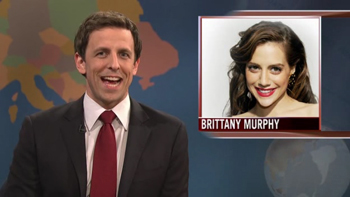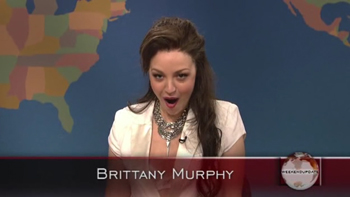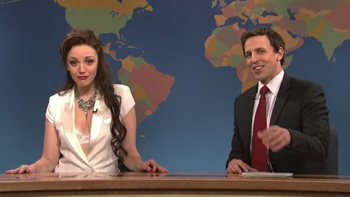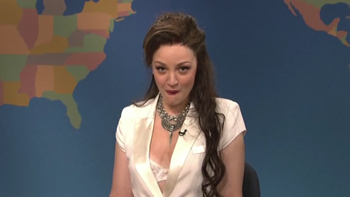Author / Edward Champion
The Gibberish Song
LA Times Books Section Gutted
L.A. Observed reports the terrible news that Orli Low and Susan Salter Reynolds have been let go from The Los Angeles Times. This leaves a skeleton crew of three manning what remains of the books section.
I haven’t met Reynolds. But I am particularly devastated to learn that Orli Low, one of the finest editors I’ve ever had the pleasure to work with, is no longer around. Let me tell you how good Orli was. Orli caught on to nearly all of my writing tricks very fast, constantly challenging me to find new phrasings and trusting me to clarify my arguments. Rather than dismissing my frequently oddball perspective, Orli always took the time to figure out where I was coming from, wanting to know the precise comparison I was making (even if she wasn’t always familiar with some of my more oblique references) and doing everything to preserve the spirit of a piece — even when we were facing a last-minute cut. Orli would often tell me over the phone to cut twelve or so words to make a piece fit. She learned very quick that I was a word units guy. This would be followed by our collaborative drowning of babies. Then there would be many unexpected discoveries as the piece transformed into something else.
What I admired so much about Orli’s editing was the way that she never gave up on a piece, even when she was facing crushing deadlines or needless space cuts, and even when there were guys like me who were perhaps a tad too attentive to the sentences.
I certainly did my best to make Orli’s job as easy as possible. But because Orli was so good, she always found the time to make a piece better. She had a great bullshit detector. And I responded very well to her combination of honesty and encouragement. Knowing something of what was going on inside the Los Angeles Times, I did my best to crack a few jokes and cheer her up over the phone. And if I learned that Orli was working on one of my pieces, I’d try to sneak in a few funny asides that I knew wouldn’t make the cut. To my surprise, a few of these bawdy subtleties found their way into the paper.
Orli helped to make me a better writer. And I know that other freelancers who worked with her felt the same way. Because of this, The Los Angeles Times‘s decision to fire her goes well beyond senseless and into the territory of “What in the hell were you thinking?” It is absolutely disgraceful and insulting for a newspaper to have fired an editor with so much talent and experience right before the holidays. The Los Angeles Times‘s books section simply won’t be the same without Orli. And I hope with all my heart that some outlet will have the smarts to snap Orli’s mad chops up, permitting her to continue what she did so well.
Permanently Deleted
I have installed WordPress 2.9. In negotiating the new features, I find myself troubled by the phrase “delete permanently,” which has replaced the more reliable and more permanent “delete.” Posts intended to disappear now reappear in a Trash folder. This is clearly a carryover from Trash and Recycled Bin, features that are found, respectively, on Mac and Windows operating systems. These are both technological concepts that we have all come to know and love. But I am more troubled by “delete permanently” suddenly appearing on WordPress. I did not want this feature and I can’t seem to disable it. “Delete” was perfectly sensible and straightforward. “Trash” implies that my silly and often foolish typing in the WordPress window is now comparable to managing battered driftwood polluting an ecosystem that is beyond my control. WordPress has turned into Max Brod defying Kafka’s wishes. I presently have 407 draft posts in WordPress. During some incarnations of this blog, there have been more. There have often been less. I liked having the nuclear option. I knew that there was some sense of finality whenever I hit the delete button. My posts were like Roman babies left a rockface, but without any actual infants dying or an internal moral dilemma. But now I have to make two decisions about whether something I delete is worth deleting.
Now I’m a fairly decisive guy. When I want to delete something, I want it gone. Even if my impulsive decision to delete something may be wrong or misguided, it’s my decision to make. But if I know that some half-assed thing I write is going to pop up somewhere else, then I’m going to revisit it. I’m going to be forced to go through the same internal questioning that came with the initial decision. And perhaps the decision will be more agonizing. I’ll have more stray bits to manage. I cannot simply kill something and accept the consequences. The timing is rather funny in light of the recent Senate vote on the healthcare bill, which, should it make its way to the end, will make it mandatory for everyone above the 133% poverty rate to give their hard-earned cash to private corporations for healthcare. I feel that my relationship with the good people at WordPress has altered along similar lines. Permanently altered. Except that I am not obligated to give them money. So perhaps this is a rather incongruous metaphor.
Anyway, while there are those who will find this feature useful and who will jump up and down knowing that the memorialization and destruction of thoughts and feelings, seemingly permanent, are now not so permanent, I find myself troubled by the downside. If data is lost, if some essay is willfully destroyed or misplaced, is there not something divine in reconstructing or revisiting it again? Is there not wisdom or strength that comes from the second or third approach? If our primordial thoughts are accessible in the Trash, then are they really permanently deleted? Yes, one can find the inner strength not to explore the Trash folder. But human curiosity being what it is….
The upshot is that I don’t like the new feature, that my blogging has permanently altered, and that I may have to rethink how I go about this silly business. I was surprised to learn on Friday night that a very amicable writer I know still uses a typewriter. But I can see why. The WordPress people, as good as they are, don’t seem to ken why this “convenient” and possibly life-saving feature creates repercussions and consequences. Like the Senate, it’s all a game to them. And I wonder if altering relationships along these lines, without having a say in the manner, is now an ineluctable part of American existence.

Brittany Murphy: Thoughts on the Saturday Night Live, December 5, 2009 Sketch
In response to Brittany Murphy’s recent death, NBC has pulled a clip from Hulu depicting Brittany Murphy (as played by Abby Elliott), appearing on the Weekend Update section of the December 5, 2009 broadcast of Saturday Night Live. What follows is the sketch presented in a manner that transforms it from its original medium (video) and therefore permits this to fall under the fair use principle. I have appended commentary near the end of this post to ensure that it will not be confused as a replica of the original material and I invite readers to cut and paste this transformative representation to any and all blogs and news organizations, so that people can be informed of what NBC is attempting to hide from the public. This representation is presented for noncommercial and educational purposes.
 TITLE CARD: BRITTANY MURPHY
TITLE CARD: BRITTANY MURPHY
SETH MEYERS: It was reported this week that actress Brittany Murphy was fired from her upcoming film, The Collar, from being a detriment to production and…oh no.
BRITTANY MURPHY: Seeeeeeeeeth.
SETH MEYERS: Brittany Murphy.
 BRITTANY MURPHY: Seth, I’m really honored to be here, hosting Saturday Night Live.
BRITTANY MURPHY: Seth, I’m really honored to be here, hosting Saturday Night Live.
[It is worth observing that Abby Elliott’s performance of Murphy involves keeping her lower jaw down and moving her head left to right, as if Brittany Murphy is mentally handicapped. Her two palms remain flat against the newsdesk.]
SETH MEYERS: No, no, Brittany, you’re not hosting.
BRITTANY MURPHY: [idiotic laugh] Yeeaaaaaaaaaaaaaaaahhhh.
SETH MEYERS: I thought you were shooting a movie right now.
BRITTANY MURPHY: Yeeaaaaaaaaaaaaaaaahhhh. They fired me. [idiotic laugh] Yeeaaaaaaaaaaaaaaaahhhh.
 [More head bobbing left and right from Slate. This is, as one would expect, your typically stupid one-note SNL sketch.]
[More head bobbing left and right from Slate. This is, as one would expect, your typically stupid one-note SNL sketch.]
SETH MEYERS: Brittany, that’s really too bad.
BRITTANY MURPHY: It’s not bad, Seth. I got a plan. When the movie comes out, I’m going to go to the theater and say, “Booooooooooooooooooo!!!!!!” (small idiotic laugh) And then the audience will join in and say, “Booooooooooooooooooo!!!!!!” And the director will say, “Awwwwwwwwww dag!” And then I’ll be all, “Told you!” Best plan ever. (idiotic laugh) Yeeaaaaaaaaaaaaaaaahhhh.
SETH MEYERS: I wouldn’t call that the best plan ever.
BRITTANY MURPHY: (shouting) Ladies and gentlemen, Blink 182.
SETH MEYERS: (slamming his desk) You are not the host, Brittany Murphy.
BRITTANY MURPHY: Yeeaaaaaaaaaaaaaaaahhhh.
SETH MEYERS: (sarcastically) Yeeaaaaaaaaaaaaaaaahhhh.
BRITTANY MURPHY: I’ll never tell.
 [Elliott then slides on her chair stage right and off camera.]
[Elliott then slides on her chair stage right and off camera.]
SETH MEYERS: Brittany Murphy everybody! (raises eyebrow in dubious belief)
COMMENTARY: Aside from the sketch’s bad timing, there are numerous problems with the concept. Beyond the sketch’s failure to establish a legitimate reason as to why Brittany Murphy should be the target of satire (presumably the sketch writer simply believed Murphy to be idiotic), and beyond the sophomoric reliance upon “Yeaaaaaaaaahhh!” and the news that she gets kicked off of film sets, it is simply not funny. If the audience is presented with a character and the character exists solely to be offered for an audience’s scorn, then we are not dealing with a character, but a flat and one-dimensional archetype. We certainly need more than junior high school verbal tics in order to either (a) relate to the character or (b) have some reason to scorn the character. We must understand the character’s motivations. And those motivations need to be presented without judgment. (In this case, Meyers exists to confirm the audience response, leaving no room for thought on the part of the audience member.) These qualities are what makes memorable comedy. What are the motivations here? Confusion and apparent stupidity. Nothing more. Not even stupidity combined with arrogance, which makes for a ripe satirical target. What made Tina Fey’s performance as Sarah Palin so memorable was that she presented us with merely a replica of the genuine article. This may say more about the failure of SNL writers to come up with original material or it may demonstrate the maxim that truth is stranger than fiction.
Aside from these conceptual logistics, the sketch is poorly executed. Abby Elliott’s performance of Murphy is exceptionally poor. Bobbing your head left and right and keeping your palms flat upon the table is the stuff of forgettable community theater. It is not the stuff of major television comedy. Granted, Elliott has been given some pretty terrible material to work from. But this does not excuse her staggering incompetence as a performer in relation to this sketch.
Finally, NBC needs to be taken to task for failing to preserve this sketch on Hulu, which will surely increase interest in the base material. The idea that NBC is above making a mistake (uh, Jay Leno?), and the failure of NBC to issue a public apology while presenting the sketch or the episode in its original form, demonstrates that it is not interested in preserving history, much less letting the people determine whether the sketch is funny. NBC’s instant and avaricious decision, together with its draconian attempt to prevent the clip from surfacing upon YouTube, shares distressing similarities to Stalinist revisionism and should be roundly rejected by anybody who values civil liberties and the freedom of expression.